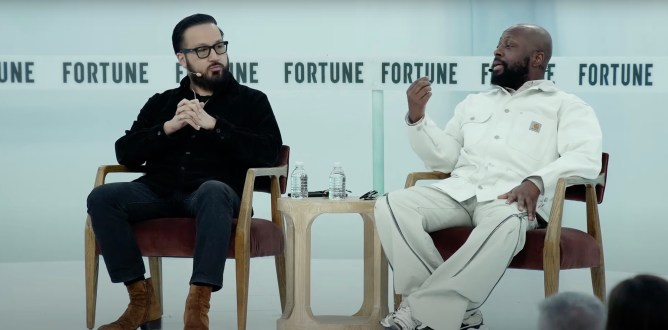Grammy Award-winning musician, composer, and producer Wyclef Jean says the music industry is broken. This is why he is now involved with a startup called OpenWav that aims to give power back to the artists. As the Chief Creative Officer, Jean had harsh words for the state of the music industry at the Fortune Brainstorm Tech conference, particularly criticizing the business model of streaming services.
Jean stated that for a new artist, the number of streams required to earn ten thousand dollars is a rip-off, leading to a constant revolt. He pointed to Cardi B as a recent example. While people may have found it funny that she was on the street selling CDs and vinyl albums to promote her album, Jean believes she was actually demonstrating how difficult things have become for artists.
OpenWav co-founder and CEO Jaeson Ma provided perspective, explaining that on Spotify, an artist must hit one million streams to earn three thousand dollars. Ma is a media industry entrepreneur and investor who has backed numerous startups. He explained that the industry’s broken model is why his team is building a direct-to-fan music platform.
Through the OpenWav app, which launched over the summer, artists can release new music and exclusives, connect directly with fans, sell merchandise, and host concerts, pop-ups, and listening parties. Ma agreed with a recent social media post from singer Lizzo, who complained about the algorithms not rewarding music and the lack of a “song of the summer” this year.
Ma explained that today’s artists do not need a million listeners on Spotify, but rather one thousand true fans. If an artist has one thousand true fans who each give ten dollars a month, that amounts to one hundred twenty thousand dollars a year, creating a sustainable career for an independent artist. He emphasized that while Spotify, Instagram, and TikTok do not pay artists, true fans will pay for tickets, exclusive music, and merchandise.
OpenWav is not alone in targeting super fans as a revenue stream. Spotify has also discussed building a super fan platform with a new premium tier that would offer early access to concert tickets and other perks. However, OpenWav is not targeting major artists like Spotify would. Instead, it focuses on indie artists and those just starting out.
The concept is not entirely new. Spotify previously allowed indie artists to upload their own music in 2018, but soon shut down the program after facing pressure from label partners who felt it cut into their sales.
When asked what makes OpenWav different, Ma admitted there are competitors but argued that none offer everything in one place. On OpenWav, artists can sell tickets and keep eighty percent of the profit, with twenty percent going to the platform. Everyone who buys a ticket joins an event chat where the artist can communicate and network with them directly. Artists can also drop merchandise in the same community chat with zero upfront costs and global dropshipping. Artists on the platform own their audience data, such as email addresses and phone numbers.
The platform also allows artists to use AI to design merchandise. Both Jean and Ma expressed enthusiasm for AI technology. Jean noted that AI can help musical artists create more than before, and Ma mentioned that record producer Timbaland uses the AI music service Suno as a sampler. In the future, OpenWav plans to use AI to help artists like a manager would, suggesting tour locations or merchandise ideas, and providing tools to create album art or lyric videos. Ma said that AI will be an artist’s best friend, with these features arriving in the app’s second phase. The OpenWav app is currently available on iOS and Android devices.

